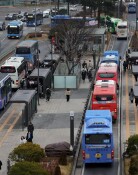Domestic hiring by Korean manufacturers declined by 180,000
Domestic hiring by Korean manufacturers declined by 180,000
Posted January. 25, 2022 08:08,
Updated January. 25, 2022 08:08
The Federation of Korean Industries announced on Sunday that domestic hiring by Korean manufacturers for the last five years declined by 180,000, while their overseas hiring rose more than 420,000. This reflects the aftermath of restructuring at shipbuilding and auto industries, resulting in less domestic hiring but more overseas hiring due to increased investment abroad. Given that local hiring at manufacturers in the U.S., Japan and Germany rose more than 3%, Korean manufacturers’ job creating abilities have deteriorated.
According to a survey of job seekers by the Korea Enterprises Federation, four out of 10 job seekers replied that public service and civil service was the most sought-after fields. More than half of the respondents said that income, welfare, and work-life balance were priority factors, while only 12.5% considered growth potential and vision as the key factors. The youth are seeing less motivation to take up challenges and pursue vision as job hiring capabilities at manufacturers dwindle.
It may be inevitable for manufacturers to relocate their business overseas and expand overseas hiring for easier parts access and targeting new consumer markets. However, countries with strong manufacturing capabilities have continuously pursued reshoring policies that focus on providing better business environments to encourage manufactures to return home, ultimately boosting job hiring.
In the U.S., the policy direction to boost manufacturing, spearheaded by President Obama’s Manufacturing Innovation Act in 2010, remained consistent throughout following administrations. Such mid-long-term policies resulted in 138,000 jobs last year created by 1,300 manufacturing companies that returned to the nation. Meanwhile, only 26 Korean companies have returned to do business domestically. High labor costs and low productivity leave Korea out of the global trend to create new jobs by strengthening the manufacturing business.
Manufacturing business has been a good source for quality jobs and key industry to boost growth potential. At the same time, falling behind in the intense global competition in the industry can make it difficult to recover. Government policies in failing to turn youth unemployment issues around, despite various measures including employment allowance and job training, is partly due to disregard for manufacturing competitiveness. Mere reduction in tax or rent is not enough to bring jobs back home. The government and political circles should prioritize labor reform to bring more flexibility and safety and improve the domestic investment climate.







